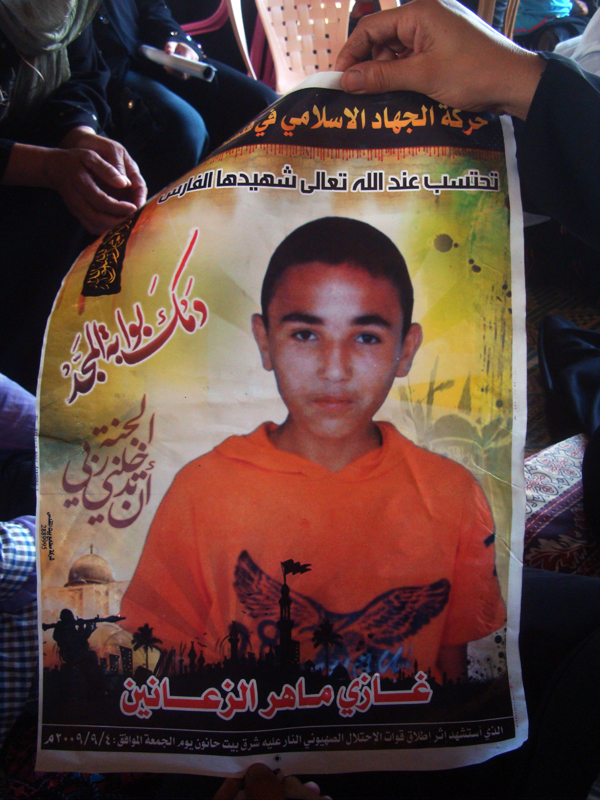ISM Gaza
31 January 2010
Farmers form the villages of Faraheen and Khuza’a , near Gaza’s second biggest city of Khan Younis, reported to the ISM that routine ’sweeps’ which Israelis carry out along the the border , disrupted the sowing of the wheat in the last few days available after the recent rainfall.
Twice a month Israeli’s enter the Gazan side of the electrified border fence to ensure that they are no explosive devices left by the Palestinian resistance in the 50 meter belt.
This is the time of increased tensions when farmers experience more incidents of intimidation and firing by the Israeli border patrols. For example, in separate incidents, Israeli border patrols fired at the farmers form villages of Faraheen and Khuza’a in the morning of the Saturday, 30th January. The farmers withdrew to the safe distance and returned to continue with the wheat sowing after the soldiers left the area.
Following the Saturday firing, the farmers from Khuza’a requested the ISM accompaniment on the next day, Sunday 31. Three ISM volunteers went with a group of six man and women to the fields 150 meters away form the border fence. Soon after, two army jeeps arrived, parked and observed the farmers for about half an hour. They where than joined by a ‘Hummer’ vehicle which farmers told us are used by the higher army ranks specialized in ‘listening’ and information gathering from a distance. All three vehicles left after a while and farmers continued with their work until it was completed.
Farmers told us that apart from fearing death or injury by shooting, they also worry about being kidnapped by the soldiers crossing to the Gazan side and that paid farm workers helping with the tractor ploughing, for example, are sometimes unwilling to take the risks.
‘We must farm our and or we will give it up bit by bit and the next generation will not have skills to work the land and will abandon it. We owe it to our children to work on our land, regardless of dangers’, said the farmer we accompanied on Sunday.
He also told us that 12 years ago he had many fruit trees and that he used to get 20 boxes of fruit form each plum tree. He also grew vegetables in the greenhouses which Israelis have since destroyed. ‘I used to sleep in the tent with my family in this very field’ he said with the nostalgia and sadness.
Updated on February 2, 2010
31 January 2010
Farmers form the villages of Faraheen and Khuza’a , near Gaza’s second biggest city of Khan Younis, reported to the ISM that routine ’sweeps’ which Israelis carry out along the the border , disrupted the sowing of the wheat in the last few days available after the recent rainfall.
Twice a month Israeli’s enter the Gazan side of the electrified border fence to ensure that they are no explosive devices left by the Palestinian resistance in the 50 meter belt.
This is the time of increased tensions when farmers experience more incidents of intimidation and firing by the Israeli border patrols. For example, in separate incidents, Israeli border patrols fired at the farmers form villages of Faraheen and Khuza’a in the morning of the Saturday, 30th January. The farmers withdrew to the safe distance and returned to continue with the wheat sowing after the soldiers left the area.
Following the Saturday firing, the farmers from Khuza’a requested the ISM accompaniment on the next day, Sunday 31. Three ISM volunteers went with a group of six man and women to the fields 150 meters away form the border fence. Soon after, two army jeeps arrived, parked and observed the farmers for about half an hour. They where than joined by a ‘Hummer’ vehicle which farmers told us are used by the higher army ranks specialized in ‘listening’ and information gathering from a distance. All three vehicles left after a while and farmers continued with their work until it was completed.
Farmers told us that apart from fearing death or injury by shooting, they also worry about being kidnapped by the soldiers crossing to the Gazan side and that paid farm workers helping with the tractor ploughing, for example, are sometimes unwilling to take the risks.
‘We must farm our and or we will give it up bit by bit and the next generation will not have skills to work the land and will abandon it. We owe it to our children to work on our land, regardless of dangers’, said the farmer we accompanied on Sunday.
He also told us that 12 years ago he had many fruit trees and that he used to get 20 boxes of fruit form each plum tree. He also grew vegetables in the greenhouses which Israelis have since destroyed. ‘I used to sleep in the tent with my family in this very field’ he said with the nostalgia and sadness.



